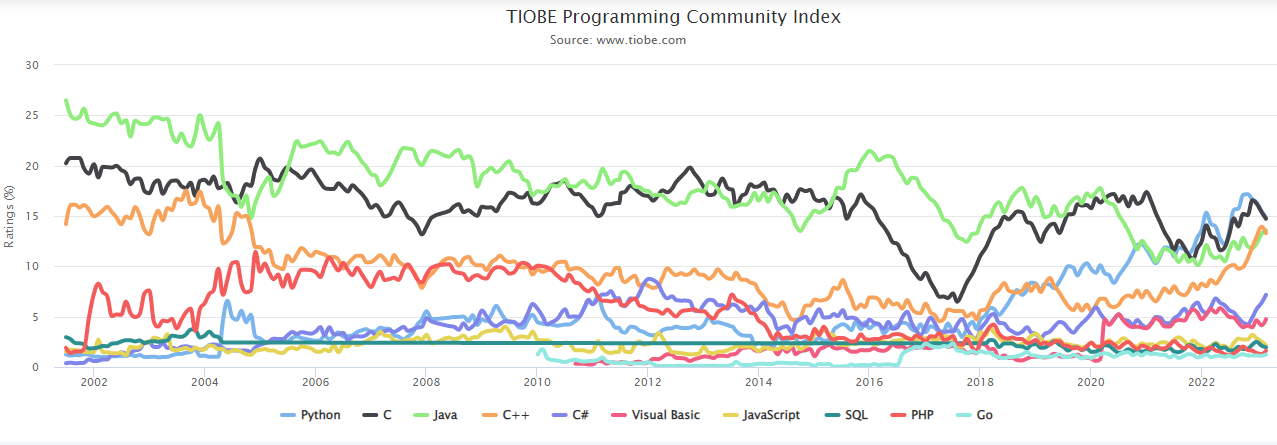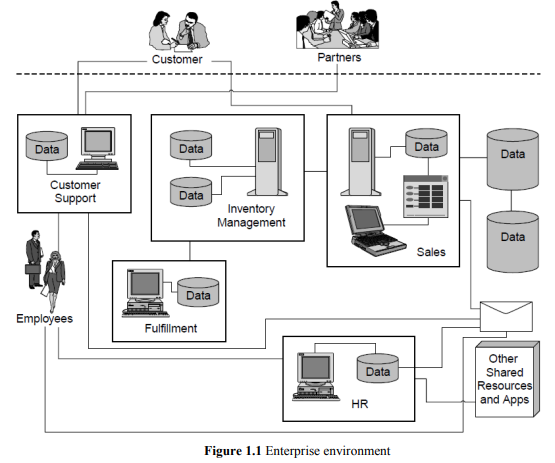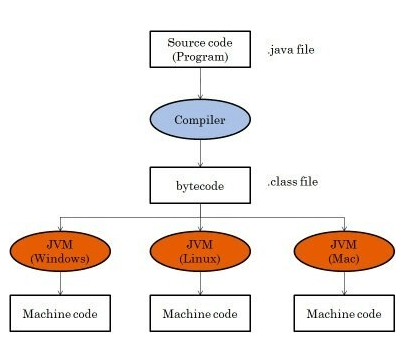Quick Summary:
Java has been the preferred choice for enterprise software development for decades. With its strong cross-platform compatibility, robustness, scalability, and security features, Java has stood the test of time. In this article, we will discuss eight compelling reasons why Java is the top choice for enterprise software development.
Enterprise applications are a major use domain of Java. For decades, Java has been one of the most popular programming languages, presently the outright #1 according to the TIOBE index.

Moreover, Java has become the go-to language for enterprise software even after 20+ years of bottleneck competition. All thanks to its flexible integrations, independent code and security, enterprises have resorted to Java development services to build enterprise applications that improve their business operations.
Before we inch ahead, here's a quick rundown of how Wikipedia outlines the term "Enterprise Software."
"Enterprise software, also termed as enterprise application software (EAS), is computer software that assists with the needs of an organization rather than individual users. Such organizations comprise businesses, institutions, interest-based user groups, clubs, charities, and governments."
In simple terms, it's a large-scale software designed to be used in a corporate environment that caters to many users and user roles and supports most of the enterprise's goals.

Today, most enterprises favour Java because it just works. So, to help you jump on the bandwagon, here's a short list of why you should pick Java for enterprise applications.
Let’s see.
Recommended Read: 20 Reasons to Choose Java for Backend Development
8 Reasons Why You Should Choose Java for Enterprise Applications?
Initially, Java was focused on meeting the specifics of enterprises and aimed at providing quick fixes to solve emerging corporate challenges.
1. Cross-Platform Compatibility
“Write once and run anywhere” is a popular phrase in the IT domain that defines the cross-platform potential of Java.
It means that apps written in Java can run seamlessly on almost all existing platforms, consisting of Windows, Mac OS, and Linux, which makes it more apt for enterprises.

This capability of Java is implemented by the Java Virtual Machine (JVM), a virtual machine built to execute bytecodes and make Java platforms independent. Whereas the irony is, JVM is platform dependent because it takes Java bytecodes and generates bytecode for the current operating system.
The platform independence of enterprise software is crucial as they are designed for a large number of users who can prefer using different platforms.
2. Heightened Security
Security is vital for enterprise applications as it forms a crucial aspect of the business. Thus, it’s essential to avert the breaching of confidential data, breaking data integrity and authorized access to the business.
In this regard, Java architecture is safer than traditional programming languages.
By choosing Java, you can rest assured as the language offers advanced security features that safeguard data and applications. Besides, if a thread dies in Java, the application stays up. Pointers are not a challenge anymore, and memory leaks rarely occur. Java’s rich library set helps developers to avoid revamping the wheel in a buggy manner.
These safety features are crucial for mission-critical applications, especially for enterprise applications.
Recommended Read: Why Java is the Preference for Top Entrepreneurs?
3. Multithreading
“Multi-threading is a way of allowing more than one program to run.”
You must be wondering what role multithreading plays in enterprise applications.
Well, a Java multithreaded environment provides faster response time, minimal issues, more operations, improved performance, and multiple requests that can be managed simultaneously. Also, a multithreading environment paves the way for lesser challenges during development.
Enterprise applications and software that manage numerous threads at once can easily do so with the help of Java enterprise application development.
4. Simple to Use
In addition to the reasons above, the simplicity of Java for building enterprise applications is acclaimed.
Writing lines of code is easy and flexible in Java, plus it also provides an understandable user interface for apps. In addition, Java codes are reusable, so enterprises and organizations can reuse them for developing other software applications.
Moreover, these codes are simple to maintain, which means it’s easy to keep the ongoing Java applications for developers as it is to create new ones.
5. Stable Language
Java is undoubtedly one of the most stable languages among all programming languages.
New versions of Java present that the old-style Java is going nowhere. For example, its 6-month upgrade cycle brings more advanced features making this programming language more predictable and stable.
Java’s exception-handling capabilities allow you to manage errors without breaking the complete application - another stability indicator Java offers. Moreover, it’s among the preferred languages for big companies that want something reliable for their technology stack.
Notably, it has nurtured credibility and reliability among companies and organizations that want to integrate a stable programming language to ensure a seamless customer experience.
6. Powerful Development Tool
Enterprise applications run a wide array of business processes, like planning, data collection and analysis, operation management, and the list, making it a must to support all the necessary functionality and efficiently manage the embedded features.
Integrated Development Environment (IDE) is among Java’s most impressive features. Java's Integrated Development Environment (IDE) is a comprehensive suite of different automation tools, debuggers, and editors.
7. Rich API
“Java has a rich and extensive Application Programming Interface (API).”
Java, a strongly typed language, can seamlessly integrate external information sources as strongly typed elements from the developer’s perspective. This is because enterprise applications and software are nowadays inclined to be information-focused instead of code-focused.
This is because the information format needs to be secured against the external interface.
Therefore, Java, as a strongly typed programming language, makes a top choice for adoption in the enterprise space.
8. Availability of Libraries
Once again, Java comes into the big picture as it supports millions of libraries that help address problems and accomplish the required functions in several ways.
The best part is that these libraries are usually free, open-source, and offer business-friendly licenses, so you can put them to use immediately. In addition, Java offers untold APIs, development environments (IDEs), and frameworks for solving most of the frequently faced issues, including automation of repetitive tasks and customer data tracking.
Well, now you have a clear picture of what makes Java an ideal choice for building enterprise applications, you start creating one! Though you can always write code from scratch to build Java applications, some frameworks allow you to build apps efficiently.
Java Frameworks for Enterprise Software Development
It’s time to understand Java EE (Enterprise Edition) frameworks!
Java EE (Enterprise Edition) frameworks are dynamic tools for building complex and extensive bodies of enterprise applications.
Let’s look at the following frameworks to create complex apps.
1. JavaServer Faces
JavaServer Faces is the Java-standard technology for developing component-based, event-oriented web interfaces. Java Community Process creates it under JSR-314.
The user-interface classes consisted of JavaServer Faces technology circumscribing the component functionality, not the client-specific presentation, allowing JavaServer Faces UI elements to be rendered to several client services.
2. Hibernate
Hibernate is a well-known Java framework, also called the Object Relational Mapping (ORM) framework of Java, extensively used to develop database structures. It’s available for free but under the GNU general public license 2.1.
This framework offers a query language for database management called HQL, besides offering seamless integration between the databases and Java-based web applications.
3. Apache Wicket
Apache Wicket, popularly known as Wicket, is easily accessible through the Apache software foundation.
It’s a lightweight web framework with an excellent user interface. Also, it’s open-source and used to create server-side web applications scripted in Java. The good part is that it can easily integrate with the HTML language, decreasing development complexity. Also, it has dynamic test applications to improve development productivity.
4. Spring
Spring is a popular and reputed Java framework in the market, with a significant ecosystem and active community enclosing it. Also, it allows you to develop enterprise-level Java applications, microservices, and web services.
5. Strut
Apache Struts is an open-source and MVC framework to create elegant and amazing enterprise-level Java applications. Often, it’s used as MVC (Model View Controller) to build interactive Java web applications.
“The main reason for Java’s success over time is its ability to evolve and adapt to new technologies”.
This can be portrayed by the Long Time Support (LTS) launch of Java 17, which provides a brace for modern architectures, like microservices-based applications, containers, and optimized footprint for edge computing.
Java and Modern Enterprise Software Development
Historically, Java applications depend on a monolithic architecture, requiring crucial overhead to support and manage over time. So, modernizing Java applications for the Cloud and containers is an opportunity to continue bringing value from these Java apps while improving scalability and performance.
Recently, application development has undergone a critical transformation as Java developers step away from conventional, monolithic architecture patterns to lighter and more modular services and functions. These are developed using cloud computing and container orchestration platforms like Kubernetes.
Perceiving that Java was not initially created for fast bootup times, low memory footprints, or containers, it evolved and succeeded.
The good part?
The benefits of Java can still be leveraged in Cloud environments with modernization.
Here are 3 approaches to help you with application modernization
What differs between monolithic and microservices-based approaches is, in fundamental terms - functional requirements. An experienced architect or developer can scale functional and non-functional requirements for a specific project. But, the modernization of any app comes down to different aspects and can be implemented in the following three ways:
- Rehost
- Replatform
- Refactor
Rehosting
Rehosting means migrating your on-premises application to the cloud without wavering it. This approach is often used to migrate large-scale applications to meet specific business goals.
Replatforming
Replatforming, as the name suggests, means improving an application from its present state while sticking to the minimum possible Twelve factors to run it on the cloud.
Refactoring
Refactoring is an approach that allows constant improvisation of business application logic that improves the code maintainability or performance.
Finally…
Java is a programming language widely used for small and end-to-end enterprise applications, from browsers to mobile apps, the Internet of Things, to servers.
Java is quite old according to programming language standards but has aged like a fine wine. So it’s right to say that Java adds up to driving IT innovations.
Should you be looking for Java consulting or need to support your enterprise-level application with advanced Java competence, consult technical experts to set up your enterprise for lasting success.






